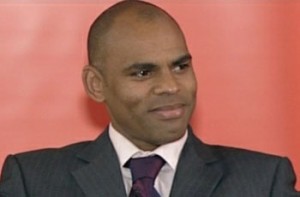Bristol’s future economic growth faces huge challenges because it is being held back by complacency combined with massive inequality, low productivity and poor infrastructure.
The stark warning emerged from Mayor Marvin Rees’ first State of the City lecture, when he vowed to stop Bristol being a “city fractured by race and class”. 
Mayor Rees, pictured, was joined by two experts on city economies who also pulled no punches in outlining Bristol’s problems.
Despite the city being one of the UK’s richest with a highly skilled workforce, high-growth industries and a quality of life that often tops national league tables, it is also among the worst in the UK for inequality – particularly in education – and poor infrastructure.
Gavin Kelly, chief executive of the Resolution Trust – which funds the Resolution Foundation think-tank – said in the recipe for what makes a successful, post-industrial 21st century city, Bristol had most of the ingredients.
But he said his jaw dropped when he saw the statistics on the city’s inequality.
“Other cities want what you have,” he told the discussion that followed Mayor Rees’ speech at the University of Bristol’s Wills Memorial Building.
“You have fantastic graduate recruitment – it’s a kind of gold other cities would love,” he said. Four in 10 of Bristol’s workforce have a degree – the largest ratio of any UK city outside London. But one in five of the city’s workforce earned less than the living wage.
The gap between the city’s affluent and deprived communities – as measured by child poverty – was far more pronounced than in places like Glasgow or Nottingham, while Bristol’s educational inequality is even worse. In inner London, 42% of the poorest pupils go on to university, 30% in Birmingham and 25% in Manchester. In Bristol it is just 13%.
“If you were born poor in this country you wouldn’t want to be born in Bristol.” said Mr Kelly.
But worsening productivity was also a huge problem in Bristol – and one that business leaders should be very concerned about, he said.
Since the financial crash Bristol’s productivity has been sliding backwards. It now stands at just 93% of the UK average.
“So while Bristol very nearly matches London in terms of the high share of graduates in the workforce, it resembles places like Darlington or North Lincolnshire in terms of productivity. That’s an odd combination. It should cause pause for thought within the city’s business community and invite questions about the utilisation of skills, along with the quality of infrastructure in the city,” he said
Alexandra Jones, chief executive of the think-tank Centre for Cities, warned that Bristol’s “complacency” was holding it back and that it needed urgently to fight for as many devolved powers as possible from central government to help tackle inequality.
“There’s complacency here that I don’t see that in Manchester,” she said.
“They have seen the cliff edge. They keep fighting [for more powers and funding].”
While Bristol was fifth out of the 63 cities the organisation charts for jobs growth, it was being held back by issues such as congestion.
“Bristol is doing well, but not well enough,” she said.
She said it was essential the city – along with South Gloucestershire and Bath and North East Somerset – pressed for as much freedom from central government as possible. The £1bn devolution deal now on the table should be the first of a series, she said, pointing out that Manchester was now on its fourth deal.
In his wide-ranging speech, titled A City For All, Mayor Rees said he wanted to increase the “diversity of thought” in the city’s leadership.
He also said he wanted to minimise the harm of Brexit to the city by working with Brussels and other cities to overcome the view that the UK anti-EU and did not welcome European workers and their families.
He pledged to reduce inequality and increase social mobility and also spoke about how restructuring the city’s economy to be more inclusive would be vital to reduce inequality.
Central to this vision was a commitment to building 2,000 homes a year – 800 of them affordable, improving transport and giving children a better start in life.
The recently launched City Office will bring together key agencies and prominent figures in city leadership to work more closely together on major issues, including homelessness and ensuring that quality work experience is available for all young people.
He also announced the launch of a strategic partnership with the not-for-profit community interest company Bristol and Bath Regional Capital to retain and attract investment at scale into housing, employment and other priorities.
He pledged to look at local planning policies to allow tall buildings in the right place, creating a “bolder skyline”, but also said the long-awaited – and much-delayed – £93m Bristol Arena would not open until 2019 at the earlist.
Mayor Rees highlighted the huge financial pressures on the city council. Acknowledging that delivering a legal budget could be painful for the city and its partners, he announced an independent review designed to identify how the council reached this challenging position. The review will be carried out by Dr Steve Bundred of the Local Government Association (LGA).
The event was part of the city’s successful Festival of Ideas.






























